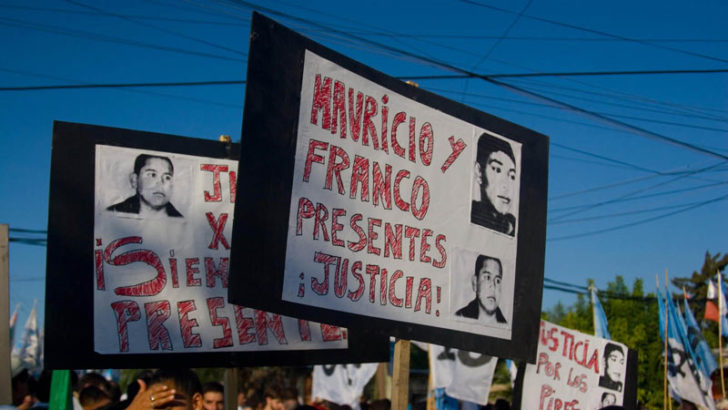On February 3, 2011, the Buenos Aires provincial police fired teargas and rubber and lead bullets at a group of residents from La Cárcova neighborhood in the district of San Martín. As a result of this repression, Mauricio Ramos and Franco Almirón were killed and Joaquín Romero was gravely injured. During the trial in 2014, the police’s actions were reconstructed and the court sentenced second lieutenant Gustavo Vega to seven years in prison for the injuries to Joaquín Romero while acquitting police officer Gustavo Sebastián Rey. In 2015, a provincial appeals court annulled Rey’s acquittal and ordered that a new trial be held to determine his responsibility in the murders. It also upped the offense for which Vega had been convicted, to attempted aggravated homicide from attempted homicide, and directed the trial court to increase his sentence, which was ultimately raised to 15 years and 6 months in prison. However, the people heading the police operation in which these two young men were killed and another was gravely injured have yet to be subjected to a judicial investigation.
From the beginning in 2011, CELS requested four times on behalf of the victims’ families that the heads of the operation – Víctor Hualde, Amado Silva Marinone and Amilcar Pino – appear before the court as defendants. However, over all these years, the public prosecutor’s office in San Martín systematically refused this request. And in December 2018, the district’s public prosecutor confirmed that the criminal case against these men was closed. At the same time, delays continue on the new trial against Gustavo Sebastián Rey, who is accused of aggravated homicide for the deaths of Mauricio Ramos and Franco Almirón. Due to successive appeals by his defense lawyers, more than three years have passed since the new trial was ordered and the families still await a start date.
Eight years after the Cárcova massacre, the judiciary has denied victims and their families the possibility of investigating the police chiefs and determining their criminal responsibility. This is a recurring problem: the resistance to seriously probing those who give the orders or who are in charge of operations that provoke grave human rights violations.
Photo: La Izquierda Diario

